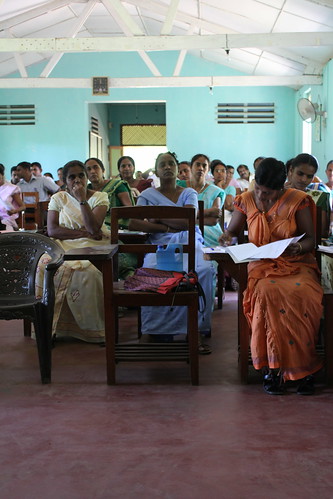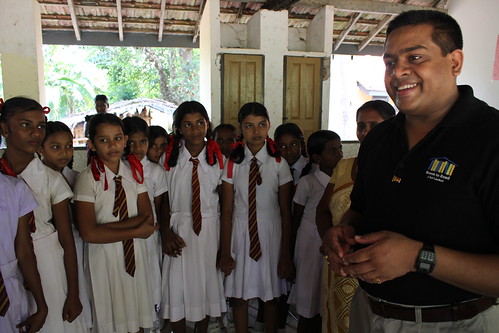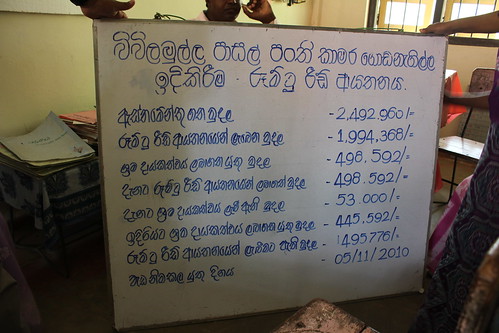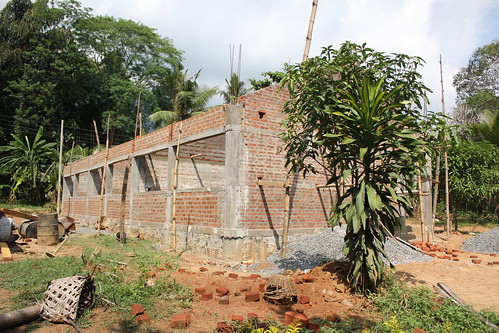First, an update from Sri Lanka! Here are some pictures from the construction site of the Tharumal Singhithi Preschool that is being partially paid for with money from sales of XKCD, Volume 0. One day soon, this building will look like this and be full of happy children!

Construction begins despite the rain
Next, the continuation of the (now very delayed) travel log!
Of the four countries I was visiting, Sri Lanka had the highest literacy rate at 90.8*. According to my guide Chandima, Sri Lanka had a proud tradition of literacy that was visible just 20 years ago: it was a common sight to see folks reading a newspaper while they sipped their tea, even in very rural areas. But the recent war and an ever-increasing emphasis on exams in the educational system are eroding this healthy habit.
With the tone of a ghost story, Chandima told me about a teacher training workshop he organized a few months ago on getting students to read more frequently. Out of curiosity, he asked the teachers how many had read a book in the last 2 weeks: to his surprise, only 5 hands went up out of the 35 teachers present. "How can they teach kids to love reading when they don't even read themselves?" Chandima shook his head, clearly still horrified.
But this is the problem of education everywhere: raising a generation of eager learners is impossible without a dedicated, inspired, and innovative group of teachers, administrators, and even parents.

At a teacher's training in Bibile
While visiting a teacher's training in Bibile, Chandima pointed out a man sitting near the back and told me his story. When he was a new teacher, he was appalled that the school had received a grant to purchase textbooks, but the principal was planning on a deal with a book vendor that would place money back in his pocket to the detriment of the quantity of books received. This was, in fact, the way it had always been done. When this teacher found out, he struggled his way to the head of the committee responsible for purchasing books and corrected the procedure, receiving twice as many books for the same amount of money. "In the whole time he's been a teacher, he hasn't stayed at any school for more than one year," Chandima said admirably. "They all transfer him because he is too much of a rebel. But that's the type of teacher we need to reform education in this country!"
Later that day, we visited a lower secondary school (grades 1-11) where the teachers and the administrators were passionate, but a lack of resources had kept test scores low until Room to Read got involved. Most of the parents in the community are day laborers who earned very little, so Room to Read has become a much-needed source of financial support for the school.
At this school the teachers and administrators took care of the kids as if they were their own: in fact, the community served by the school is so small that all 242 students were actually related to each other! The teachers work closely, trying to develop cross-disciplinary curricula while fostering a love of learning and a love of the region in the students. 28 of the school's 142 girls participate in the Girls Education Program. These girls were outspoken in class, and teachers said that they had been visibly uplifted by the clean uniforms, books, and bikes they received. Of all the Girls Education Program students I met with in 4 different countries, this group of girls seemed the most confident.

Chandima with the GEP girls
The school was also receiving new classrooms as part of Room to Read's "School Rooms" project. To keep communities abreast of exactly where the money is going and to promote transparency as a standard practice among the NGOs working in the country, Room to Read Sri Lanka has started placing whiteboards outside the construction sites. These whiteboards are a great low-tech solution to get the community involved and interested.

A publicly-displayed "anti-corruption" whiteboard next to the RtR construction site
To keep costs low and to create jobs within the community, Room to Read negotiates with local contractors to both parties' benefit: Room to Read receives a discount in exchange for providing the contractor with steady work, not to mention improving facilities at the school attended by the contractor's children. Chandima proudly announced that the full cost of the new school building to Room to Read including materials, labor, furnishings, and books came out to 2.5 million LKR (~$22,600 USD). The school officials told us that another international NGO had built a less complicated library building for their school the year before that cost 4 million LKR (~$36,000 USD) for the building alone. Chandima did not know about this, and looked visibly upset that money had been spent so inefficiently when it could have gone towards doing more good. Later, he told me that this was part of the reason why he had left a larger NGO to join Room to Read: "As a Sri Lankan, I know how to get things done as inexpensively as possible, the way the locals would do it. There's no reason to be wasteful just because you have a large budget; there's always work to be done."

School room under construction
One of the most interesting lessons that was really driven home on my trip through Asia was that education reform has to include teachers and administrators. Without dedicated role models who are themselves passionate about education, it is hard to instill excitement for learning in students. Luckily, Room to Read's staff seem like just that--a group of professionals like Chandima who work hard and diligently for a cause they really believe in.
* This number, like literacy rates all over the world, is hotly contested for a variety of reasons


:-) Sri Lankans are generally literate but to get them to read books is difficult. they are not very creative writers, and the translations they have in print are grotesque…. but they are avid newspaper and periodical readers Ill admit.
Y’all are doing such a great job with all this! I am terribly proud of everyone.
Sri Lanka: Leading by Example | Breadpig: Purveyor & Publisher of ……
Here at World Spinner we are debating the same thing……
[WORDPRESS HASHCASH] The comment’s actual post text did not contain your blog url (http://breadpig.com/2011/01/19/sri-lanka-leading-by-example) and so is spam.